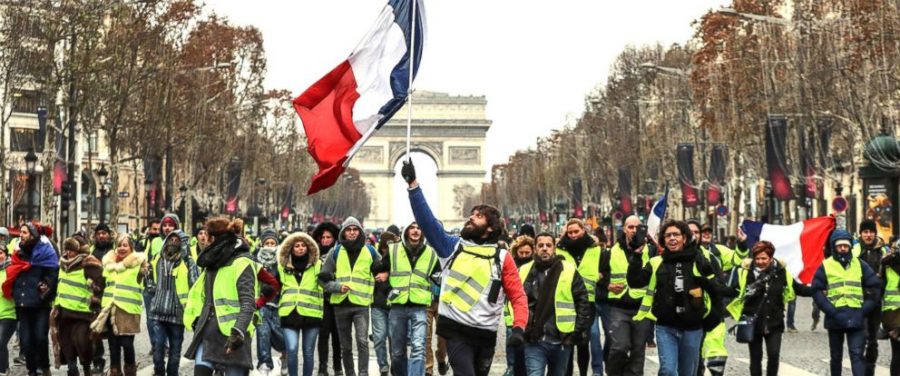Yellow Vest Protests in France Raise Questions about Climate Change Policy
The protests have lasted over a month.
French drivers are required to keep a yellow vest in their cars, a safety measure if they end up in an accident and need to be visible. A little more than a month ago, French citizens became very visible as they took to the streets to protest the increase in fuel taxes, which hit nearly 20 percent. Working class commuters wore their yellow vests to show unity in the movement against French President Macron.
Macron installed the new tax to help protect the environment and aimed to reduce carbon emissions by 40 percent by 2030. He hoped that with the higher costs, drivers would choose public transportation instead or buy electric vehicles. Long-distance commuters from rural areas were most affected by this new hike in fuel prices, because the availability of new, greener transportation was not an investment they were able to make.
“The gas tax is the straw that broke the camel’s back. A lot of other things are going on in France, kind of bubbling under the surface,” French teacher Mrs. Kaytlyn Byers said. “I think they’re taking the gas tax as…the chance to be like ‘let’s just wreak havoc until we can solve a lot of problems that are happening.’”
Anger with the new president didn’t start or end with the fuel taxes. Overall, middle class citizens are concerned about their financial situation. Many feel as if they are too wealthy to receive the majority of government benefits, but too poor to afford the necessities that they need.
The protesters organized the demonstrations through social media communication. With no official leaders, the protests widely expanded to encompass different causes and methods of dissent. Most recently, protesters have broken down windows of shops, hurled missiles, and torched cars.
“I think [the protests] are justified because these extra taxes make it harder for lower income families to support themselves,” senior Gianna Griffith said.
Along the Champs-Elysees, luxury stores have boarded up their windows, in fear that they may be the next victim. Despite these safety measures, protesters completely tore down the plywood and broke through to throw fire into the shops. Police have tried to counter and deter the violence with tear gas and water cannons.
French protests are very different from American ones. In France, protests are commonplace, something expected. Striking is not uncommon in France, but what sets the yellow vest protests apart is the scope, anger, and destruction.
“When I lived in a city in the south of France, probably every month the transportation would go on strike. It’s just something that you cope with and you deal with,” Mrs. Byers said. “Anything and everything can go on strike. On [France’s] Labor Day, everybody goes on strike. They just find what issue they wanna talk about that day.”
Macron gave a televised address in the end of November, where he announced that he would not be pressured by “thugs” into changing policy. Despite his words, his actions proved to be different. Firstly, he vetoed his plan to raise fuel taxes in order to appease the public, but the protesting has continued. Macron then promised to raise the minimum wage and raise savings pensions this week.
“Macron is already working towards a solution, that but he needs to revisit the policies that started the protest in the first place,” sophomore Lucas Zhang said. “In general, I think that it’s more about the economy and less about France itself.”
Similar protests have emerged in Sweden, Germany, Belgium, the Netherlands, and Canada. Since the start of issues in France, Egypt has banned the sale of yellow vests, in fear that they might also experience a similar revolt.
“[Protesting is] more individualistic in America, because people usually protest for themselves,” senior Mariama Sohna said. “But [in other countries,] it’s a movement. In America, it’s a moment.”
In America, there are similar calls for environmental regulations by the Democratic party, while the Republican party claims that climate change poses no immediate threat to the people. Consequently, Democrats are outraged and want, among other environmentally friendly policies, regulations in place to limit fossil fuel consumption.
However, there are currently no plans in either the House of Representatives or the Senate to enact such legislation. Unlike France, America has no current strategy to curb the infamous climate change that has concerned many environmental scientists. Instead, President Trump has stated that he doesn’t believe in man-made climate change.
It remains to be seen whether Democrats will be able to push through any national legislation that will limit the man-made climate change. However, it is clear that the two parties are divided on the issue, and a situation like the one France is in is not likely to happen anytime soon. The main question that American politicians face now is whether or not climate change policy in the U.S. would result in similar protests and financial devastation.

Senior Bridgette Lang is a third-year staff reporter and former features editor, now serving as opinion and our world editor for the Spotlight. In addition,...

Senior Kennah Salvo is the features editor and a third-year staff reporter and former news editor for the Spotlight. She is a member of the Feminist Student...

Senior Sarah Jacobson is a third-year staff reporter, former Our World editor, and current Editor-in-Chief of the Spotlight. She is also the head of social...


